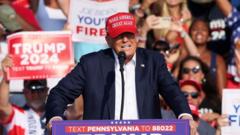In a rising tide of trade tensions, Brazilian President Lula has firmly stated that Brazil will match any tariff hikes imposed by the United States, particularly in light of a recent threat from US President Donald Trump, who suggested a 50% import tax on Brazilian goods. Lula's response highlights Brazil's sovereignty and counters claims made by Trump regarding trade deficits and Brazil's judicial system concerning former President Jair Bolsonaro, who is facing trial for alleged coup attempts. As Brazil finds itself at the center of escalating global trade disputes, the implications of these threats are far-reaching, straining diplomatic relations and potentially impacting both economies.
Brazil Responds Firmly to Trump's Tariff Threats: A New Era of Trade Tensions

Brazil Responds Firmly to Trump's Tariff Threats: A New Era of Trade Tensions
Brazilian President Luiz Inácio Lula da Silva asserts that his country will retaliate against US tariffs, emphasizing sovereignty in response to Donald Trump's recent threats.
Brazilian President Luiz Inácio Lula da Silva has publicly declared that Brazil is prepared to counter any tariffs imposed by the United States, in response to President Donald Trump's recent threat of a hefty 50% import tax on Brazilian goods beginning August 1. This escalatory rhetoric comes amid ongoing tensions associated with the treatment of former President Jair Bolsonaro, who is currently undergoing trial for allegedly attempting a coup following his electoral defeat by Lula in 2022.
In a letter to Lula, Trump expressed his concern over Bolsonaro's trial, branding it a "witch hunt" and advocating for an end to the proceedings. His comments echo an ongoing alliance between Trump and Bolsonaro, as both leaders have previously shared mutual support.
Lula, in a robust rebuttal via social media, asserted Brazil's sovereign status and independence from US influence. He affirmed that his administration will not tolerate such unilateral tariff increases, signaling that similar charges would be levied on American goods in retaliation. The proposed tariff increase, which would inflate the current rate of 10% significantly, could severely impact Brazil, the US's second-largest trading partner after China.
Conversely, Lula challenged Trump’s assertion that the US suffers a trade deficit with Brazil, citing US trade data indicating a surplus of $7.4 billion for the US in goods trade with Brazil in 2024. This statistic could have significant implications for future negotiations.
While Trump's tariff threats also extend to 22 countries, including Japan and South Korea, Lula's response emphasizes a more personal aspect, as it addresses Trump’s comments on Brazil's legal actions related to Bolsonaro. The Brazilian leader stood firm on the rationale behind these judicial decisions, defending Brazil's stance against hate speech and misinformation online.
Political analysts believe that despite the conflict, Trump's politically charged letter may inadvertently bolster Lula’s domestic support, reminiscent of past instances in other countries where leaders have gained popularity after standing up to Trump’s confrontational style. However, experts caution that Lula's government must present a cohesive and organized response to effectively leverage the situation and gain political capital.
As both leaders navigate this complex landscape of trade negotiations and political alliances, the path ahead appears fraught with uncertainties, with the potential for substantial consequences in bilateral relations and the global economy.




















